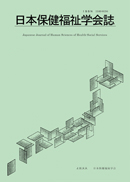Volume 24, Issue 2
Displaying 1-18 of 18 articles from this issue
- |<
- <
- 1
- >
- >|
-
2018Volume 24Issue 2 Pages cover1
Published: March 30, 2018
Released on J-STAGE: July 18, 2018
Download PDF (544K) -
2018Volume 24Issue 2 Pages cover2
Published: March 30, 2018
Released on J-STAGE: July 18, 2018
Download PDF (544K)
-
2018Volume 24Issue 2 Pages 1-2
Published: March 30, 2018
Released on J-STAGE: July 18, 2018
Download PDF (469K)
-
2018Volume 24Issue 2 Pages 3-15
Published: March 30, 2018
Released on J-STAGE: July 18, 2018
Download PDF (1236K)
-
2018Volume 24Issue 2 Pages 17-21
Published: March 30, 2018
Released on J-STAGE: July 18, 2018
Download PDF (1153K) -
2018Volume 24Issue 2 Pages 23-28
Published: March 30, 2018
Released on J-STAGE: July 18, 2018
Download PDF (881K) -
2018Volume 24Issue 2 Pages 29-33
Published: March 30, 2018
Released on J-STAGE: July 18, 2018
Download PDF (3606K)
-
2018Volume 24Issue 2 Pages 35
Published: March 30, 2018
Released on J-STAGE: July 18, 2018
Download PDF (512K)
-
2018Volume 24Issue 2 Pages 37-39
Published: March 30, 2018
Released on J-STAGE: July 18, 2018
Download PDF (455K) -
2018Volume 24Issue 2 Pages 40
Published: March 30, 2018
Released on J-STAGE: July 18, 2018
Download PDF (453K) -
2018Volume 24Issue 2 Pages 41-43
Published: March 30, 2018
Released on J-STAGE: July 18, 2018
Download PDF (457K) -
2018Volume 24Issue 2 Pages 44-49
Published: March 30, 2018
Released on J-STAGE: July 18, 2018
Download PDF (535K) -
2018Volume 24Issue 2 Pages 50
Published: March 30, 2018
Released on J-STAGE: July 18, 2018
Download PDF (451K) -
2018Volume 24Issue 2 Pages 51
Published: March 30, 2018
Released on J-STAGE: July 18, 2018
Download PDF (402K) -
2018Volume 24Issue 2 Pages 52
Published: March 30, 2018
Released on J-STAGE: July 18, 2018
Download PDF (402K) -
2018Volume 24Issue 2 Pages 53
Published: March 30, 2018
Released on J-STAGE: July 18, 2018
Download PDF (403K)
-
2018Volume 24Issue 2 Pages cover3
Published: March 30, 2018
Released on J-STAGE: July 18, 2018
Download PDF (134K) -
2018Volume 24Issue 2 Pages cover4
Published: March 30, 2018
Released on J-STAGE: July 18, 2018
Download PDF (138K)
- |<
- <
- 1
- >
- >|
